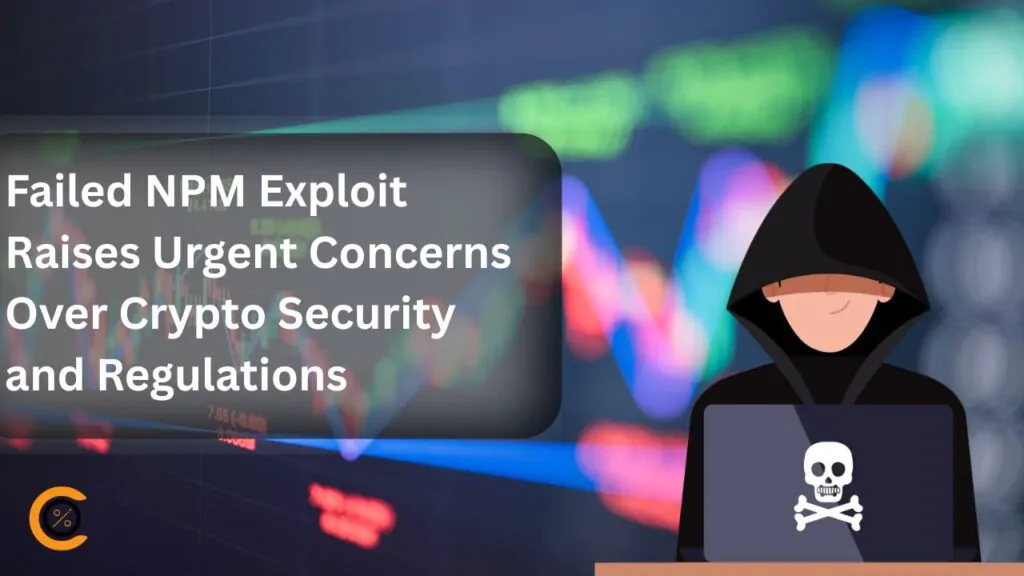- •Hackers attempted a supply-chain attack on JavaScript libraries to alter cryptocurrency wallet transactions, but the exploit was quickly shut down.
- •Such attacks are unique in that they target core code dependencies, potentially affecting millions of users across crypto platforms.
- •Ledger’s CTO calls for increased oversight, security audits, and industry collaboration to protect the crypto ecosystem from future threats.
The latest unsuccessful attack of the popular Node Package Manager (NPM) ecosystem has resurfaced worries over the weaknesses of cryptocurrency infrastructure. As the Chief Technology Officer of Ledger says, malicious hackers tried to introduce malicious code to several widely-used JavaScript libraries in order to modify crypto wallet operations. Although the attack was promptly spotted and prevented before it could inflict mass destruction, it highlights the instability of critical digital infrastructure on which millions of users of crypto use on a daily basis.
The exploit, which fails here, but points to the sophistication of cyberattacks on the decentralized economy, is increasing. Contrary to more traditional hacks, supply-chain attacks attack the core of software integrity, and malicious users can impact a large number of users at once.
Justification of Supply-Chain Attacks Being a Special Threat
In contrast to direct wallet breaches or phishing attacks, supply-chain attacks attack the libraries of code that form the basis of innumerable applications. The NPM ecosystem also drives a plethora of crypto wallets, decentralized applications and exchange platforms. Unnoticed, the malicious code installed in such libraries may divert transactions, rob user funds or destroy trust in whole networks.
Security experts believe that such a kind of vulnerability is particularly worrying since users and developers alike are not usually able to see the libraries that are driving their tools. A single per-vulsed dependency can percolate through thousands of projects, posing systemic risks that can be many times larger than individual wallet hacks. The unsuccessful NPM exploit is thus a lesson to the cognitive industry as a whole.
Calls for Stronger Regulation and Oversight
In the case of the CTO of Ledger, the author pointed out that decentralized ecosystems are more successful in the sense that they focus on innovation, yet they can never be beyond the gaze of regulations in situations where systemic risks arise. Cryptocurrencies are becoming more subject to governmental and regulatory focus on the necessity of more transparent cybersecurity of crypto infrastructure.
The future Markets in Crypto-Assets (MiCA) regulation by the European Union and the U.S. discourse on consumer protection in digital assets may include a closer regulation of the practice of development and software supply-chains.
Additional proactive measures supported by industry leaders are required security audits on open-source libraries that are employed in crypto applications, heightened accountability in developers, and quick vulnerability reporting tools. Devoid of such defences, the probability of a successful supply-chain attack increases as the adoption of digital assets increases.
Creating a Stronger Crypto Future
Although the most recent adventure was not that successful, it makes a clear reminder of the pitfalls inherent in the principles of the crypto economy. The episode highlights the need to have all industry stakeholders, open-source developers and regulators work together. Security has ceased being a technical problem and it is also a governance problem- a problem that may dictate the credibility of digital assets in the mainstream finance.
The fight against crypto security is not over yet, as Ledger CTO cautions. Innovation, vigilance, and well-established regulatory frameworks will be the call to strike a balance in strengthening resilience to supply chain attacks. The moral of the failed NPM exploit is obvious: the promise of decentralized finance can be torn to shreds by the most fragile of all codes, unless it is secured accordingly.







